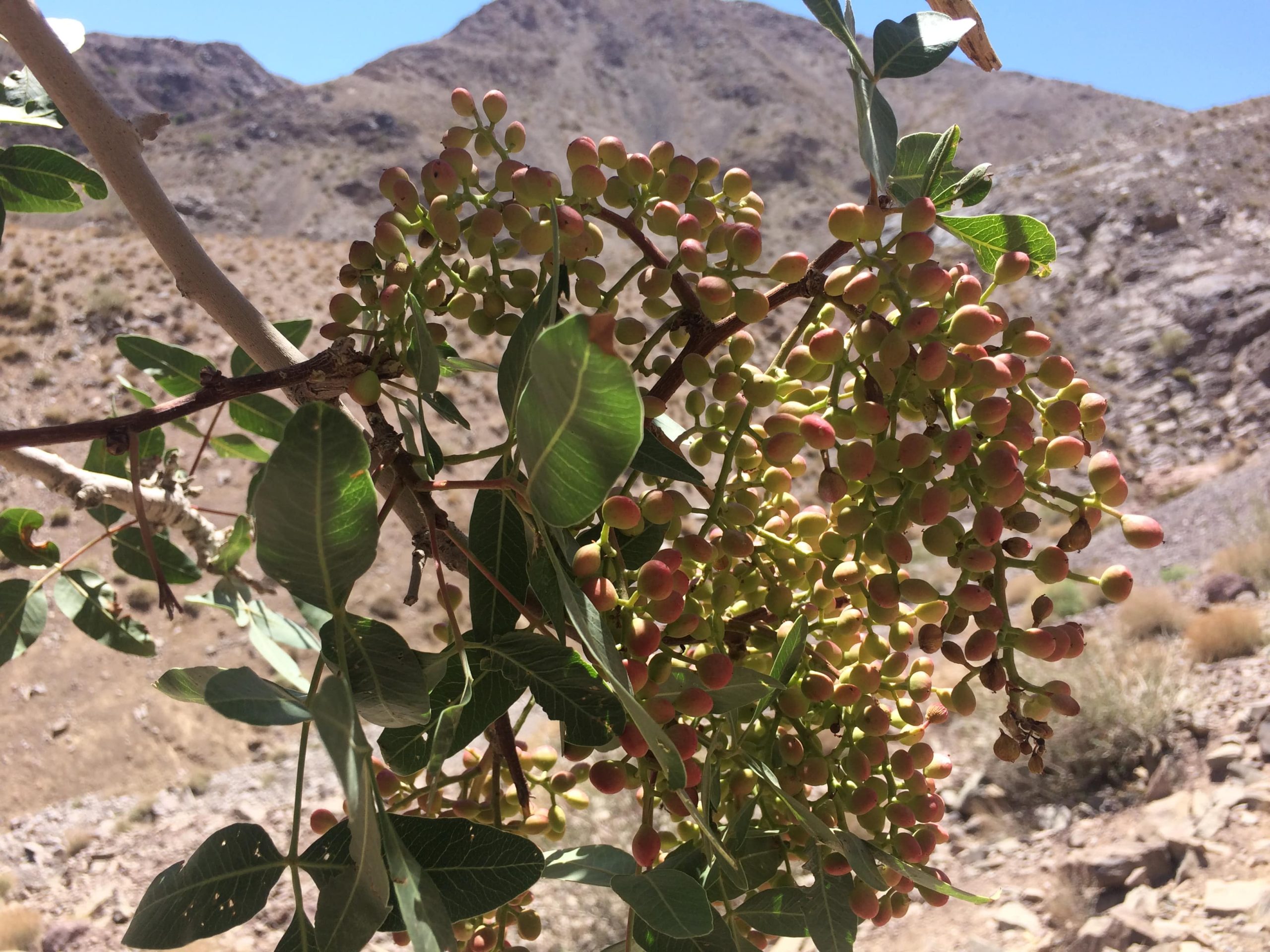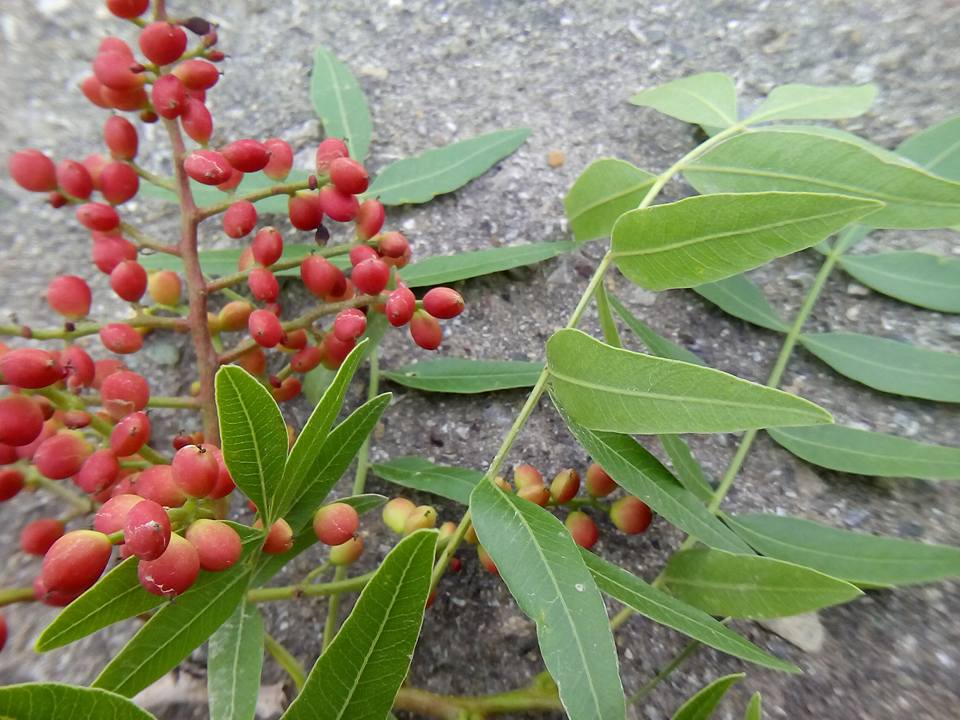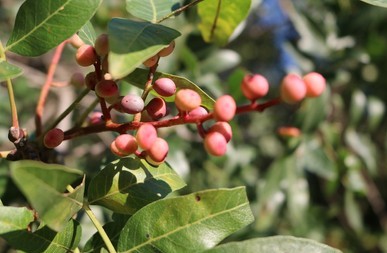Mt. Atlas mastic tree,Atlas pistachio,
Atlantic pistachio,Atlantic terebinth,
Cyprus turpentine tree,
Persian turpentine tree
Medicinal Uses
The resin obtained from this tree is antiseptic, antispasmodic, cytostatic, expectorant and vulnerary. It is taken internally in the treatment of chronic bronchial infections, streptococcal, urinary and renal infections, hemorrhage, gallstones, tapeworm and rheumatism. Externally, it is used to treat arthritis, gout, sciatica, scabies and lice. It has also been used in the treatment of cancer.
Temperament of Pistachio atlantics in Persian medicine
According to Persian medicinal literature, all the materials in the world exhibit four main qualities: “warmth”, “coldness”, “wetness”, and “dryness” is a predominant quality (or qualities). According to the previously-mentioned idea, herbal medicines have a specific temperament. Each particular part of the P. atlantics species has different degrees of temperament. Fresh fruit is warm and dry in degree 1; dried fruit is warm and dry in degree 3; resin is warm and dry in degree 2; fresh leaves and branches are warm and dry in degrees 2 and 1, respectively.
Mode of application in traditional medicine
Gastrointestinal effects
The fruit and resin of P. atlantics have beneficial effects in upper and lower gastrointestinal disorders. The resin is a stomach tonic and it is used for dyspepsia, stomach ulcer, esophagitis and gastritis. Oleoresin is an appetizer, a laxative, and it is advantageous for anal fissures. The fruit is carminative and effective in nausea and vomiting, colic, hemorrhoid, anal fissures and intestinal worms.
Hepatic and splenic effects
The fruit and resin of P. atlantics are liver tonics and have hepatoprotective properties. They are prescribed for hepatic weakness, hepatitis and ascites. The fruit is a spleen tonic and it is prescribed for splenic stagnation.
Neurological effects
The resin and fruit of P. atlantics are nerve tonics and are useful in Bell’s palsy, stroke, tetanus, seizure, tremor and headache.
Heart and psychological uses
This plant has beneficial effects for palpitations and syncope; its fruit also has antidepressant properties.
Respiratory benefits
P. atlantics (resin & fruit) are prescribed for pneumonia and productive cough due to mucolytic properties.
Urogenital effects
The fruit of P. atlantics has been known as a kidney tonic and aphrodisiac; also, it is used for nephrolithiasis.This plant (resin & fruit) has diuretic and emmenagogue properties.
Dermatologic benefits
This plant is effective for wound healing, scabies, lip fissures and hair loss.
Pharmacological effects
Antimicrobial Activities
P. atlantics has antibacterial properties against a large number of Gram-positive and Gram-negative bacteria. The oleoresin from P. atlantics var. kurdica with its major component -pinned has antibacterial properties against Helicobacter pylori . Another research showed that acidic fractions resin of P. atlantics has extensively inhibitory effects against Escherichia coli, Salmonella typhimurium, Pseudomonas aeruginosa, Alcaligenes faecalis, Enterobacter aerogenes, Pseudomonas fluorescens, Bacillus cereus, Streptococcus faecalis, Staphylococcus aureus and epidermidis.The methanolic extract from P. atlantics fresh fruits has been shown to affect fungi and yeast, such as Candida albicans, Candida glabrata and Saccharomyces cerevisiae.The leaves and twigs of P. atlantics with its active substance 3-methoxy carpachromene showed antiprotozoal activity against Plasmodium falciparum. In addition, P. atlantica var. kurdica gum could prevent cutaneous leishmaniasis from infected mice.
Antioxidant Activity
The main phenolic compounds of the fruits and leaves of P. atlantics are benzoic acid derivative, hydroxycinnamic acid derivative, and flavonoids that have antioxidant properties. Sinapic acid, vanillic acid and p-hydroxybenzoic acid are metabolites of hull and shell extracts with antioxidant properties.A study has demonstrated the existence of new natural antioxidant ingredients isolated from the mushroom Inonotus hispidus growing on P. atlantica.


Antihyperlipidemic effects
Research on animals revealed that P. atlantics fruit oil decreased LDL cholesterol, VLDL cholesterol, triglycerides and increased HDL cholesterol.
Hypoglycemic effects
Aqueous leaf extract from P. atlantics has hypoglycemic effects due to the inhibitory effect on α-amylase .An in vivo study has also shown postprandial glucose improvement equal to glipizide and metformin and higher than acarbose in rats.
Other Uses
Yields the resin ‘Cyprus turpentine’, which is obtained from incisions made in the bark (not the trunk) of the tree. The incisions are made from mid-summer to mid-autumn. It is mainly used medicinally in the treatment of cancer and also as a chewing gum. The plant can be used as a rootstock for the pistachio nut, P. vera. A red dye is obtained from galls that are formed on the leaves by aphis. The plant is a source of tannin.

